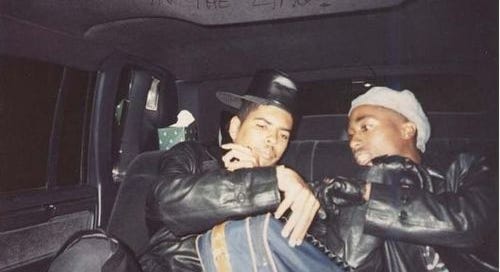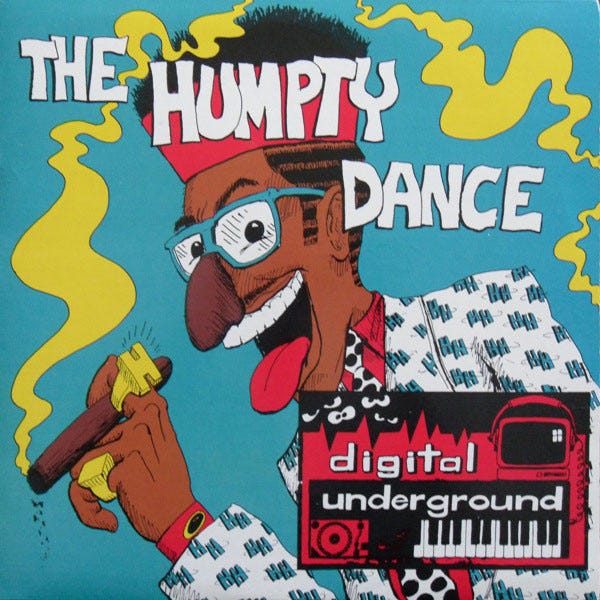Shock G on the Track
A look at the late artist's formidable musicianship and production skills.
MC, musician, and producer Shock G passed away on April 22nd at age 57. Born Gregory Edward Jacobs, he was known by many for his role as the frontman of pioneering rap group Digital Underground, his close friendship and frequent collaboration with 2Pac, and his larger than life alter ego Humpty Hump.
His relationship with the Humpty Hump alias was complicated - the goofy persona sometimes overshadowed his formidable resume and his encyclopedic knowledge of funk and other genres.
Shock G’s multi-decade music career defies easy classification - perhaps that’s why his accomplishments were sometimes overlooked. Though his distinctive voice and impressive delivery make it easy to focus on his microphone dexterity, he was also a remarkable producer who conveyed a wide range of sound and style over the years.
He earned his first production credit on Digital Underground’s funky debut single “Underwater Rimes.” The song was a preview of a burgeoning production style that rapidly evolved on more sophisticated future compositions.
While “Underwater Rimes” helped Digital Underground gain recognition, it was Shock G’s production and performance on the group’s 1989 smash single “The Humpty Dance” that truly elevated them to a new plateau. The song was also an early showcase of his multifaceted production approach, as he deftly played a killer synth bassline while arranging several different samples for a neck-snapping final product.
From weaving together multiple sample sources to expertly flipping one sample, Shock could do it all. His reimagining of Herbie Hancock on 2Pac’s “Words of Wisdom” was the perfect backbone for one the most powerful songs from the legendary MC’s early years.
As he produced Digital Underground party anthems and impassioned, revolutionary 2Pac album cuts, Shock G also demonstrated a gift for remixing superstar artists. Though not necessarily a radical departure from the Teddy Riley original, his 1993 remix of Bobby Brown’s “Get Away” offered a different energy that worked well with the singer’s voice.
Shock also developed a unique production technique where he would take an extended, tweaked vocal sample and layer it into the beat so it sort of sat underneath the main track. Listen to 2Pac’s “I Get Around” - which he co-produced as part of D-Flow Production Squad - and take note of the clever incorporation of Zapp’s “Computer Love” as an example. You can hear it right at the opening, the six-second mark, and at various other parts of the song.
He took this technique to another level on Pac’s D-Flow Production Squad-produced “So Many Tears” - one of the most powerful records from the late MC’s entire catalog. His use of Stevie Wonder’s “That Girl” is so clever it almost obscures the well-known original, while the extended vocal accent put the beat in a league of its own. (Go to the 0:08 mark for an example.)
“So Many Tears” turned “That Girl” into something deep and mournful by decreasing the tempo by about 14 beats per minute. The slowed down harmonica on the hook is the ultimate emotional gut punch while the effortless incorporation of Quincy Jones’ “The Dude” into the track can’t be overlooked.
Though Shock G had an extensive career with Digital Underground, produced for a variety of artists, remixed songs for Bobby Brown and Prince, toured and performed with P-Funk, and drew a cartoon for Rakim in the late 1980s that remains on his studio wall today, it seems his life as a recording artist took a serious toll on him.
When Digital Underground co-founder Chopmaster J broke the news of his passing on Instagram he wrote the following:
“34 years ago almost to the day we had a wild idea: We can be a hip hop band and take on the world through it all the dream became a reality and the reality became a nightmare for some.”
It’s heartbreaking to think that Shock’s career was such a burden to carry, especially when he inspired and influenced so many.
May we continue to share and celebrate his work for many years to come.
If you enjoyed this article, please subscribe to the Micro-Chop newsletter to support independent music journalism.





Genius king, I miss you my brother my friend.